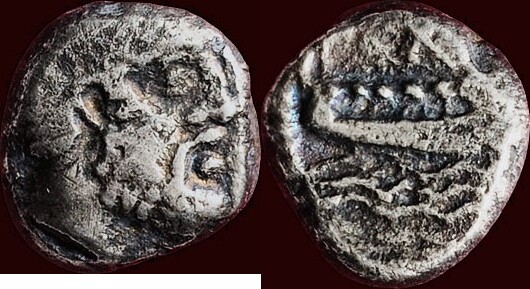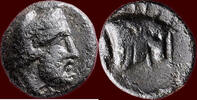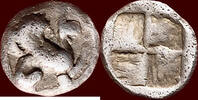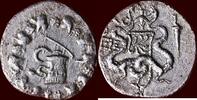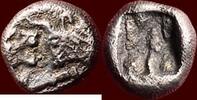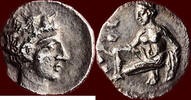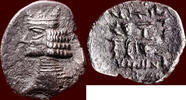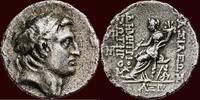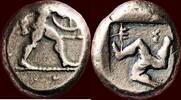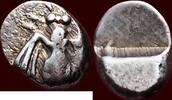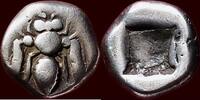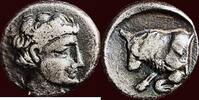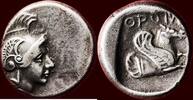MA-ID: 8074902010
Customer feedback Henzen
Schnelle Lieferung. Super Ware. Vielen Dank!
O.K.
perfekt !!!
Great coin, quick delivery, thanks!
tetrobol 380-350 BC v. Chr. PHOENICIA, ARADOS (ARWAD) - AR 1/3 Shekel of circa 380-350 BC f / vf
Munthandel G.Henzen 

10
On MA-Shops since 10 years
7244 ratings,
100 % Positive (last 24 months)
Worldwide shipping
227.04 US$195,00 EUR
Import tax may be added
+ 37.26 US$ shipping ( to United States )
Delivery time: 7 - 10 days
+ 37.26 US$ shipping ( to United States )
| Customer Support 941.210.2677 |
| Payment methods |
| Wire Transfer |
f / vf | Abbreviations
BMC 27-36 & 37-44 | SNG.Copenhagen 17 | Fitzwilliam 5992 Weber collection 8010 | McClean 9445 | Betlyon 86, 11-12 Babelon, Achéménides 129, 886 (Pl. XXII, 16) | Sear 5972 Mitchiner ATAEC- (vgl.1265) | HGC 10, no.40
11.00 mm
weight 2,84gr. | silver Ø 11mm.
small, thick planchet (= BMC 37-44)
obv. Laureate and bearded head of Ba′al-Arwad (Lord of Arwad) right
rev. Phoenician bireme (war galley) right above waves, figure
of Pataikos right on prow, row of shield on bulwalk. Phoenician
letters ″Mem Aleph″ (= Melech Arwad = King of Arwad) above
Early coins of Arwad (Greek Arados) have the Aramaic letters mem aleph (read from right to left) above the galley, abbreviating Melech Arad (meaning King of Arwad), sometimes followed by the king′s initial, and sometimes by the Phoenician regnal year date.
The Phoenicians, a Semetic people, developed remarkable proficiency in shipbuilding, seafaring and trade, as the prophet Ezekiel (lived circa 622 – 570 BC) observed. Phoenicians invented the alphabet, which their Greek neighbours and trading partners adopted and transmitted to us. In turn, they acquired the idea of coinage from the Greeks, and the coins of the half-dozen Phoenician city-states give us a window into their history and beliefs. Like so many things in ancient numismatics, the date and identity of the first Phoenician coins are uncertain. The earliest date generally accepted by scholars is about 450 BC. Initially, the coins were all silver–from distant mines in Spain and possibly Sardinia–with weights based on variations of the Babylonian shekel of 7.2 grams. Very small fractions were issued, down to 1/24 shekel (about half a gram, and 10 mm in diameter).
BMC 27-36 & 37-44 | SNG.Copenhagen 17 | Fitzwilliam 5992
Weber collection 8010 | McClean 9445 | Betlyon 86, 11-12
Babelon, Achéménides 129, 886 (Pl. XXII, 16) | Sear 5972
Mitchiner ATAEC- (vgl.1265) | HGC 10, no.40 R
a rare coin type
f/vf
small, thick planchet (= BMC 37-44)
obv. Laureate and bearded head of Ba′al-Arwad (Lord of Arwad) right
rev. Phoenician bireme (war galley) right above waves, figure
of Pataikos right on prow, row of shield on bulwalk. Phoenician
letters ″Mem Aleph″ (= Melech Arwad = King of Arwad) above
Early coins of Arwad (Greek Arados) have the Aramaic letters mem aleph (read from right to left) above the galley, abbreviating Melech Arad (meaning King of Arwad), sometimes followed by the king′s initial, and sometimes by the Phoenician regnal year date.
The Phoenicians, a Semetic people, developed remarkable proficiency in shipbuilding, seafaring and trade, as the prophet Ezekiel (lived circa 622 – 570 BC) observed. Phoenicians invented the alphabet, which their Greek neighbours and trading partners adopted and transmitted to us. In turn, they acquired the idea of coinage from the Greeks, and the coins of the half-dozen Phoenician city-states give us a window into their history and beliefs. Like so many things in ancient numismatics, the date and identity of the first Phoenician coins are uncertain. The earliest date generally accepted by scholars is about 450 BC. Initially, the coins were all silver–from distant mines in Spain and possibly Sardinia–with weights based on variations of the Babylonian shekel of 7.2 grams. Very small fractions were issued, down to 1/24 shekel (about half a gram, and 10 mm in diameter).
BMC 27-36 & 37-44 | SNG.Copenhagen 17 | Fitzwilliam 5992
Weber collection 8010 | McClean 9445 | Betlyon 86, 11-12
Babelon, Achéménides 129, 886 (Pl. XXII, 16) | Sear 5972
Mitchiner ATAEC- (vgl.1265) | HGC 10, no.40 R
a rare coin type
f/vf
Please respect our order minimum of 20 Euros. For EU only IBAN payment please. Shippings to China are on risk of the buyer and only payment by bankwire or WISE. Shipping will take place within 5 days after receipt of payment. Sendings to Russia,Ukraine and Israel are not possible. Additional administration- and risk costs for PayPal & creditcard payments. No PayPal or creditcardpayments possible for orders over 10.000 euro.
| Shipping fees | ||||
|---|---|---|---|---|
| up to 116.43 US$ | 116.43 US$ to 582.15 US$ | 582.15 US$ to 1,164.29 US$ | over 1,164.29 US$ | |
| Argentina | 37.26 US$ | 37.26 US$ | 46.57 US$ | 46.57 US$ |
| Australia | 40.75 US$ | 40.75 US$ | 46.57 US$ | 46.57 US$ |
| Belgium | 11.06 US$ | 12.81 US$ | 15.14 US$ | 20.96 US$ |
| Brazil | 64.04 US$ | 64.04 US$ | 64.04 US$ | 64.04 US$ |
| Bulgaria | 16.30 US$ | 18.63 US$ | 40.75 US$ | 52.39 US$ |
| Chile | 58.21 US$ | 58.21 US$ | 58.21 US$ | 58.21 US$ |
| China | 46.57 US$ | 46.57 US$ | 58.21 US$ | 58.21 US$ |
| Denmark | 13.39 US$ | 15.14 US$ | 18.63 US$ | 23.29 US$ |
| Germany | 11.06 US$ | 12.81 US$ | 15.14 US$ | 20.96 US$ |
| Estonia | 15.14 US$ | 16.30 US$ | 17.46 US$ | 29.11 US$ |
| France | 11.06 US$ | 12.81 US$ | 18.63 US$ | 29.11 US$ |
| Greece | 17.46 US$ | 29.11 US$ | 34.93 US$ | 40.75 US$ |
| United Kingdom | 29.11 US$ | 29.11 US$ | 30.27 US$ | 32.60 US$ |
| Hong Kong | 46.57 US$ | 46.57 US$ | 58.21 US$ | 58.21 US$ |
| India | 40.75 US$ | 40.75 US$ | 46.57 US$ | 58.21 US$ |
| Indonesia | 40.75 US$ | 40.75 US$ | 46.57 US$ | 46.57 US$ |
| Israel | 232.86 US$ | 232.86 US$ | 232.86 US$ | 232.86 US$ |
| Japan | 46.57 US$ | 46.57 US$ | 46.57 US$ | 46.57 US$ |
| Cambodia | 75.68 US$ | 75.68 US$ | 75.68 US$ | 75.68 US$ |
| Canada | 34.93 US$ | 34.93 US$ | 40.75 US$ | 40.75 US$ |
| Liechtenstein | 23.29 US$ | 23.29 US$ | 29.11 US$ | 29.11 US$ |
| Luxembourg | 12.81 US$ | 15.14 US$ | 18.63 US$ | 29.11 US$ |
| Malaysia | 40.75 US$ | 40.75 US$ | 46.57 US$ | 52.39 US$ |
| Netherlands | 9.90 US$ | 9.90 US$ | 12.81 US$ | 16.30 US$ |
| Norway | 29.11 US$ | 29.11 US$ | 34.93 US$ | 40.75 US$ |
| Austria | 13.39 US$ | 14.55 US$ | 17.46 US$ | 29.11 US$ |
| Poland | 15.14 US$ | 16.30 US$ | 19.21 US$ | 29.11 US$ |
| Portugal | 15.14 US$ | 16.30 US$ | 20.96 US$ | 29.11 US$ |
| Romania | 18.63 US$ | 20.96 US$ | 29.11 US$ | 40.75 US$ |
| Russian Federation | 232.86 US$ | 232.86 US$ | 232.86 US$ | 232.86 US$ |
| Switzerland | 34.93 US$ | 34.93 US$ | 46.57 US$ | 46.57 US$ |
| Serbia | 29.11 US$ | 29.11 US$ | 34.93 US$ | 40.75 US$ |
| Singapore | 40.75 US$ | 40.75 US$ | 40.75 US$ | 46.57 US$ |
| Slovakia | 15.14 US$ | 17.46 US$ | 23.29 US$ | 29.11 US$ |
| Spain | 13.39 US$ | 15.72 US$ | 19.21 US$ | 29.11 US$ |
| Sri Lanka | 40.75 US$ | 40.75 US$ | 46.57 US$ | 52.39 US$ |
| Czech Republic | 13.97 US$ | 16.30 US$ | 20.96 US$ | 29.11 US$ |
| Ukraine | 232.86 US$ | 232.86 US$ | 232.86 US$ | 232.86 US$ |
| Hungary | 16.30 US$ | 18.63 US$ | 29.11 US$ | 34.93 US$ |
| United States | 37.26 US$ | 37.26 US$ | 40.75 US$ | 46.57 US$ |
| European Union | 17.46 US$ | 19.79 US$ | 29.11 US$ | 34.93 US$ |
| World | 46.57 US$ | 46.57 US$ | 58.21 US$ | 58.21 US$ |
Information
Online orders are welcome as always and will be shipped directly.
|
Seller Home | 0Shopping cart | Terms of sale | Contact | MA Terms of sale | Privacy policy | Warranty | MA-Shops New Items Copyright ® 2001-2025, MA-SHOPS Coins All Rights Reserved. Designated trademarks and brands are the property of their respective owners. |
 Buy coins with warranty
Buy coins with warranty



